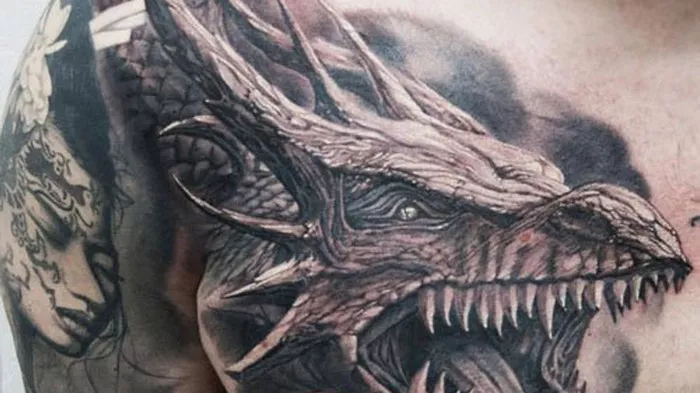Dragon tattoos are among the most popular designs in the tattoo world, celebrated for their beauty, intricacy, and rich symbolism. However, some individuals may harbor concerns about potential bad luck associated with these mythical creatures. This article will explore the various cultural beliefs surrounding dragon tattoos, investigate the origins of these notions, and discuss personal perspectives that shape how individuals view their significance. By the end, you’ll have a comprehensive understanding of whether dragon tattoos truly carry the weight of bad luck.
1. The Symbolism of Dragons Across Cultures
1.1 Dragons in Eastern Mythology
In many Eastern cultures, particularly in China and Japan, dragons symbolize good fortune, strength, and protection. They are revered as auspicious beings that bring prosperity and success.
1.2 Dragons in Western Mythology
Conversely, Western depictions of dragons often lean towards the negative, associating them with destruction and chaos. Understanding these differing viewpoints can shed light on why some might consider dragon tattoos unlucky.
1.3 The Dual Nature of Dragons
Dragons embody duality; they can represent both benevolence and malevolence depending on the cultural context. This complexity influences how people perceive dragon tattoos and their associated luck.
2. The Origins of the Bad Luck Myth
2.1 Historical Context
The idea that dragon tattoos might bring bad luck may stem from historical events or societal beliefs that paint dragons in a negative light. Exploring these origins can clarify misconceptions.
2.2 Folklore and Superstitions
Various superstitions surrounding tattoos, in general, often feed into the belief that certain designs, including dragons, might bring misfortune. Understanding these stories can help contextualize such fears.
2.3 Personal Anecdotes and Experiences
Many beliefs about bad luck can be traced back to personal experiences or anecdotes. Investigating individual stories related to dragon tattoos can reveal a broader pattern of perception.
3. Analyzing the Impact of Tattoo Culture on Beliefs
3.1 The Evolution of Tattoo Perception
Tattoo culture has evolved significantly over the years, from taboo to acceptance. This shift affects how people view designs like dragon tattoos, including their associations with luck.
3.2 The Role of Social Media
The influence of social media platforms has reshaped perceptions of tattoos, often highlighting positive stories and experiences. This visibility can challenge the notion of dragon tattoos as bad luck.
3.3 Generational Differences in Beliefs
Different generations may have varying opinions on the luck associated with dragon tattoos. Understanding these generational perspectives can provide insight into the persistence or decline of such beliefs.
See also: Are Dragon Tattoos Cringe? The Cultural Significance, Trends
4. Cultural Beliefs and Superstitions Surrounding Tattoos
4.1 Tattoos as Symbols of Rebellion
Historically, tattoos have been associated with rebellion and non-conformity. This connection can lead to a negative perception of certain designs, including dragons, as bad luck.
4.2 The Connection to Identity and Spirit
In some cultures, tattoos are viewed as a way to embody one’s spirit or identity. This belief can influence whether a tattoo, including a dragon, is considered a source of bad luck.
4.3 Respecting Cultural Traditions
Cultural beliefs about tattoos vary widely, and it’s essential to approach these topics with respect. Understanding the cultural context can clarify the meanings behind dragon tattoos and their perceived luck.
5. Personal Perspectives on Dragon Tattoos
5.1 The Individual Meaning of Dragon Tattoos
For many, dragon tattoos symbolize personal strength, transformation, or resilience. These individual meanings can overshadow any beliefs about bad luck.
5.2 Tattoo Stories and Experiences
Sharing personal stories about dragon tattoos can provide insight into how individuals perceive their designs. These narratives often highlight the positive experiences associated with these tattoos.
5.3 Finding Empowerment Through Tattoos
Many individuals find empowerment in their tattoos, viewing them as symbols of overcoming adversity rather than harbingers of bad luck. This perspective can shift the narrative surrounding dragon tattoos.
6. Addressing Common Misconceptions
6.1 Overgeneralization of the Bad Luck Belief
Many beliefs about tattoos and luck can be overly generalized. Not all dragon tattoos carry the same connotations, and it’s essential to consider individual stories and cultural backgrounds.
6.2 The Role of Tattoo Quality and Placement
The quality of the tattoo and its placement can influence perceptions of luck. A well-crafted dragon tattoo may be viewed positively, while a poorly executed design could contribute to negative beliefs.
6.3 The Importance of Intent and Personal Connection
The intent behind getting a tattoo often plays a crucial role in how it is perceived. A dragon tattoo chosen for personal significance is less likely to be viewed as unlucky.
7. The Psychological Aspect of Beliefs
7.1 The Power of Belief
Psychological research shows that beliefs can significantly influence experiences. If someone believes a dragon tattoo will bring bad luck, their perception may become a self-fulfilling prophecy.
7.2 Overcoming Negative Associations
Individuals can work to overcome negative associations with dragon tattoos through positive affirmations and reframing their beliefs. This psychological shift can change how they view their tattoos.
7.3 The Impact of Community and Support
Surrounding oneself with supportive communities can help counter negative beliefs. Engaging with others who celebrate dragon tattoos can foster a more positive outlook.
8. Conclusion
The question of whether dragon tattoos are bad luck is complex and multifaceted, influenced by cultural beliefs, personal experiences, and societal perceptions. While some may associate dragon tattoos with misfortune, many others celebrate their rich symbolism and personal significance. Ultimately, the meaning behind a dragon tattoo is deeply personal, shaped by individual stories and perspectives. By fostering an understanding of these dynamics, we can challenge negative stereotypes and embrace the empowering nature of dragon tattoos.
You Might Be Interested In
The Direction of Power: Which Way Should a Dragon Tattoo Face?

